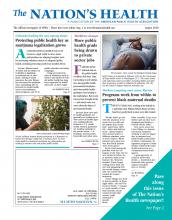Adverse childhood events can contribute to negative health outcomes that last a lifetime. Such events can include household intimate partner violence, substance abuse, mental illness, parental separation, divorce or having an incarcerated household member. Neglect and emotional, physical and sexual abuse are also important factors.
A study initiated by researchers at Kaiser-Permanente over 20 years ago documented that people who experience ACEs are at risk for disrupted neurodevelopment and social, emotional and cognitive impairment, confirming what public health workers have long observed. The link between ACEs and higher risks of chronic diseases is being investigated.
The Centers for Disease Control and Prevention has been collecting data on ACEs through its Behavioral Risk Factor Surveillance System for about 10 years. Data from 2011-2014 show that 38.5% of people reported no ACEs, while 15.8% had four or more, the highest score.
Public health professionals across the country are working on ways to address ACEs, linking their work to social determinants of health and toxic stress levels in individuals, families and communities.
Let me share what I have heard from our colleagues and my own thoughts and questions about ACEs and public health. While there has been a call for ACEs screening, questions remain as to what we should be screening for. Should the list of adversities be expanded to include peer victimization, exposure to community violence, experiencing racism and living in foster care? How predictive of negative health outcomes is an ACEs score?
We need to remain cognizant that screening tools are still early in development and will require rigorous evaluation. Who will do the screening, and under what circumstances? Are there consequences of screening that need further exploration, such as training requirements or skeptical practitioners who worry about attaching stigma to children or feel that screening may alter provider relationships? What about policymakers?

Interventions also require our attention. Is there sufficient data to support actions? Are interventions evidence-based? Sufficiently funded?
Getting families initial and sustained access to services is no easy task, but promising work is underway. A 2015 study in Pediatrics found an association between addressing social determinants of health at well-child visits and increased maternal use of community resources.
Perhaps our most important role in public health is that of developing and critically evaluating programming that embraces primary prevention and works to mitigate ACEs before they occur. Protective factors have not been studied nearly as often as risk factors. Our work requires a broad array of partners to perform the research, advocate for funding and carry out programming. For what role are you and your co-workers best suited?
Pass along this issue of The Nation’s Health. Engage co-workers in a discussion about ACEs and the other stories in this issue.
- Copyright The Nation’s Health, American Public Health Association









